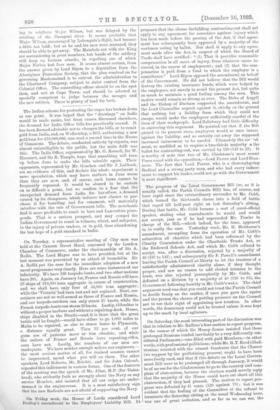On Friday week, the House of Lords considered Lord Dudley's
amendment to the Employers' Liability Bill. It proposes that the clause forbidding contracting-out shall not apply to any agreement for assurance against injury which has been made before the passing of the Act, if that agree- ment has subsequently been approved by a majority of the workmen voting by ballot. Nor shall it apply to any agree- ment made after the Act, in respect of which the Board of Trade shall have certified : "(1), That it provides reasonable compensation in all cases of injury, from whatever cause in- curred, in the course of employment ; and (2) that the com- pensation is paid from a fund to which the employer is a contributor." Lord Ripon opposed the amendment on behalf of the Government. He did not believe that the Bill would destroy the existing insurance funds, which were helped by the employers, not merely to avoid the present Act, but quite as much to maintain a good feeling among the men. This motive would remain as strong as ever. The Duke of Argyll and the Bishop of Durham supported the amendment, and the Lord Chancellor argued against it, chiefly on the ground that nothing but a liability from which they could not escape, would make the employers sufficiently careful of the lives of their workpeople. Lord Salisbury had little difficulty in answering this argument. He pointed out that if the Bill passed in its present state, employers would at once insure against the liability, and so entirely cut away the supposed increased inducement to be careful. Ultimately the an, –ad- ment, so modified as to require a two-thirds majority n the ballot for contracting-out, was carried by 120 (148 to 28). It is worthy of note that two of Mr. Gladstone's most recent Peers voted with the opposition,—Lord Ferrer and Lord Stan- more. The fact that Lord Farrer, who is a thoroughgoing Radical, and a strong party man, and who had every induce- ment to support his leader, could not go with the Government is most significant.










































 Previous page
Previous page